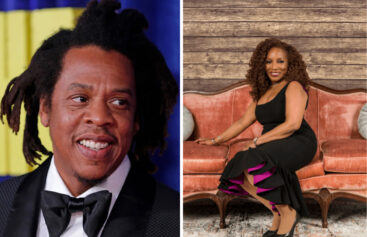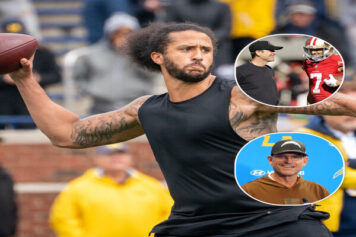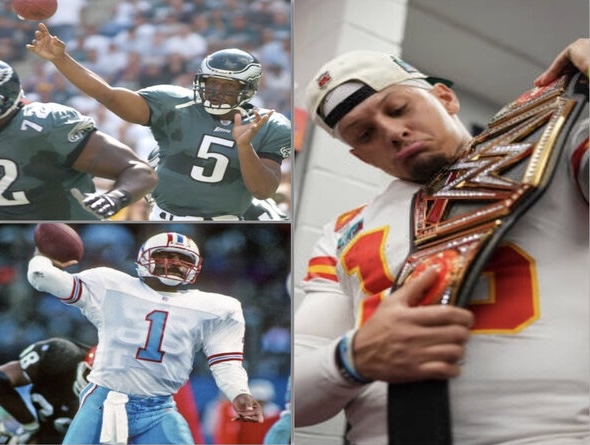When Dr. King was marching on Washington and getting arrested for peaceful protests, sit-ins and non-violent demonstrations, he wasn’t doing it to get his own reality show or be the rave of social media. He rose to become the leader of the Civil Rights Movement because he possessed the qualities of being able to captivate the masses, compromise with the enemy and rise to the occasion – even in the darkest of times – with a calm and confident demeanor.
MLK wasn’t a tall man. He stood about an inch or two shorter than the dopest 5-10 QB on the planet – Seattle’s Russell Wilson. Both diminutive men are giant in stature. Their rare combination of relentlessness, quiet confidence, immeasurable heart and dedication to their chosen purpose resulted in them becoming leaders who other strong men willingly and confidently follow into any field of battle.
While MLK ducked billy clubs, fought attack dogs and fire hose assaults, and braced for police macings and brutal beatings, Wilson’s been ducking defenders, fighting height discrimination and bracing for ferocious hits and attacks from sasquatch-like, ball-obliterators looking to put an end to his glorious rise.
MLK marched because his predecessors were beaten and systematically crippled when they tried to speak out against injustice. Wilson balls so hard and it means so much because the history of the QB position in the NFL is marred by systematic discrimination, bias and oppression of the black athlete.
The depths of MLK’s influence on society and his adoption of Gandhi's peaceful protest tactics places him among the all-time humanitarians and selfless social activists in American history.
It’s difficult to compare an athlete's performance in the entertainment arena to MLK’s grassroots, front-line approach to ending segregation and the overall oppression of African-Americans living in the U.S. during the ‘50s and ‘60s. Jackie Robinson probably comes the closest. His courage and calm in the face of venomous racism, opened the floodgates for blacks and hispanics in baseball.
More importantly, his success helped advance out-dated, discriminatory American ideologies concerning African-Americans and changed racially-jaded and primitive ideologies concerning the black athlete’s ability to compete in the white man’s game.
On a smaller level, but still very significant in the scope of today’s society, Wilson’s success with the Seahawks is a continuing symbol of the African-American’s struggle for equal opportunity.
As much as the face of NFL QBs has darkened due to the influx of dual-skill QBs, spread and pistol offenses and zone read attacks, only one African-American QB has tasted Super Bowl success. He's Washington Redskins’ Doug Williams in 1988 and it took a courageously-flawless and improbable performance by the Williams to capture Super Bowl XXII MVP honors and lead Washington to a 42-10 trouncing of Denver.
That game is forever recognized as a watershed moment in the NFL’s contributions to advancing cultural diversity in professional athletics. If Williams had failed that day it would have reinforced biased notions that black QBs lacked the noodles and intangibles to lead an NFL team. MLK was surely looking down with pride that day and some believe it was his spirit that lifted Williams off of that turf and back into the game after he hyperextended his knee on a sack at the end of the first quarter with Washington trailing 10-0. It was all bad. Then it was all good.
It was obviously Williams’ destiny being played out and he was merely a vessel in a production that was long overdue and transcended sports. MLK, Williams, Wilson. All confident, but reserved cats. They have chips on their shoulders the size of a boulder hardened by years of being doubted. But they carry the chip with grace, dignity and honesty, making it more of an enhancing accessory than a glaring disfigurement.
Wilson is the anti-Richard Sherman.
His method of motivating teammates is more, “why not us,”- the same phrase his dad motivated Wilson with when times were hard. Wilson’s not from the Rich Incognito, “I’m better than you so do what I say or get punched in the face,” school of motivation.
Wilson’s hard knocks come from a discipline that allows him to operate with dignity, humility and diligent leadership.
Wilson has elevated himself to the cusp of another great moment in American history. Wilson once again proved why he is a giant among men and has an uncanny, almost-spiritual ability to put his team on his back when times appear shaky and pull them across the finish line. Look how the Seattle D turn up every time Wilson does something incredible on offense.
Wilson has made a habit of accomplishing the remarkable, since leading the Seahawks to the playoffs in his rookie season. He proved it again on Saturday by lifting the Seattle Seahawks to a 23-17 comeback victory over a tough 49ers squad in the NFC Championship Game in just his second tour of NFL duty.
At the time, Williams' victory was also significant because he was facing legendary Denver Broncos quarterback John Elway, who was the prototypical image of what NFL QBs were supposed to be at the time; big, tall, strong, not particularly fast or athletic and white. The Redskins set an NFL record by scoring five touchdowns in the second quarter. Williams completed 18 of 29 passes for 340 yards, with four touchdown passes.
Wilson is in a similar situation as he takes center stage against one of the game’s immortal players Peyton Manning, who is seeking a proper Super Bowl send off to culminate a legendary career. If Wilson’s Seahawks can accomplish what is sure to be a tough task and stop the prolific Broncos offense in Super Bowl XLVII on February 2; Wilson will become just the second black QB to win it and the first in over 25 years. Such a feat will also bring permanent legitimacy to the dual-threat quarterback. And proof that through embodying the principles of the Civil Rights movement – patience and persistent struggle – all that was once considered bad about the skill-set of black QBs is now recognized as great.
Some people don’t believe in destiny, but Wilson’s performance in the clutch on Saturday made it obvious that no one was stopping his rise. Not the early 10-0 49ers lead, not the way the 49ers defense knocked him around like a pinball and hunted him like wolves on a bleeding soldier lost in the wilderness.
One play – the 4th and seven, 35-yard TD strike to wide receiver Jermaine Kearse between 49er defenders to give Seattle a 20-17 lead – tells you all you need to know about “Coolwater” Wilson.
He’s the total package and the athletic and scholarly manifestation of Dr, King’s greatest ambitions.
Wilson is always the underdog and will probably remain that entering the big game. Denver opened as a 1-point favorite over Seattle on the Glantz-Culver Line. He started at the bottom of the depth chart at North Carolina State and rose to starter before being released from his scholarship in 2011 for refusing to give up baseball. He goes to Wisconsin where he throws 33 TDs, leads them to the Rose Bowl and sets the single season FBS record for passing efficiency (191.8). Then he has to sit in embarrassment as he falls to the 12th pick of the third-round of the NFL Draft in 2012. He’s drafted by the Seahawks, earns the starting job from HC Pete Carroll, but fans wanted Matt Flynn to start.
Wilson’s family gave him the grit and belief to dream colossal. Losing his father shortly after getting drafted by MLB's Colorado Rockies made him tragedy-tough.A prep school education provided him with the knowledge needed to compete in the world away from athletics.
Collegiate School is almost 100 years old. It’s a preparatory school whose campus and tuition rivals a small college. It’s a major talent pool for Ivy League recruiters and there are 1,600 students, from kindergarten through 12th grade. Wilson was one of those prep kids. He walked the path to manhood – from kindergarten through his rough junior high school years as a rambunctious kid who stayed in principal Charlie Blair’s office – to him blossoming into class president by his senior year.
MLK would be proud of Wilson. He embodies the dream that MLK was striving for and that he laid out in his classic “I Have A Dream “ speech.
Wilson is biracial. He’s intelligent, having taken advantage of traditionally white institutions of higher learning previously unavailable to African-Americans. He has a pristine public image, is articulate and a solid role model for young black kids searching for a legit hero.
Seattle will meet Denver (15-3) for the Lombardi trophy in two weeks in the New Jersey Meadowlands. It's the first trip to the big game for the Seahawks (15-3) since they lost to Pittsburgh after the 2005 season. Both conference champs had the best records in the league this year and it’s the second time the top seeds have gotten to the Super Bowl in 20 seasons.
"It will be a great matchup," coach Pete Carroll said at the press conference following the game. "I think it's an extraordinary opportunity to go against a guy (Peyton Manning) that set all the records in the history of the game (and still has something to prove because of a rocky playoff history)."
Word on the NFL streets is, Peyton is as focused and determined as ever. Maybe he is. But in my little black book, MLK’s Dream trumps Peyton’s Redemption Scene. Obama’s in office. The new Mayor of NYC has interracial kids. The Super Bowl is in the Tri-State area, which has as many blacks living MLK’s dream as you’ll find anywhere in the world. And teams won’t be playing too far from Flushing Meadow, Queens, home of the U.S. Open. The tournament where legendary tennis star Arthur Ashe shattered color barriers when he won the US Open in 1968, becoming the first black male to capture the title. Because of ballers like Wilson and his 49ers QB counterpart Colin Kaepernick, black QBs are in high demand after once being considered the plague. They are not only being lauded for their physical prowess but for their intelligence and leadership savvy as well. That’s Dr. King’s dream in a nutshell. Advantage Wilson.



